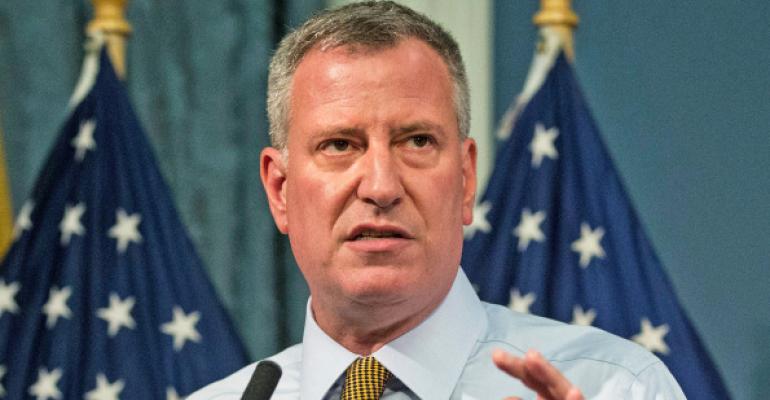(Bloomberg)—New York Mayor Bill de Blasio’s affordable housing program has not benefited enough of the city’s lower-earning working and homeless families and requires a massive infusion of money to achieve its aims, city Comptroller Scott Stringer said.
The mayor has set a goal of building or preserving 300,000 “affordable” units by 2026 as one of his signature programs. Its strategy relies on “inclusionary zoning,” which requires developers to set aside a percentage of apartments at below-market rents in return for subsidies and permits for higher density. The rezoning program has been attacked by local residents who say it promotes gentrification.
“Failing to target the city’s affordable housing resources toward the greatest need will not move the needle in the long run,” Stringer said. “The city will remain increasingly unaffordable, and homelessness will stubbornly persist.”
For Stringer, who has openly discussed his interest in running for mayor in 2021, the affordable housing proposal amounted to a sharp critique of a policy that de Blasio has touted since taking office in 2014.
The mayor, who has vowed to make New York the “fairest big city” in the U.S., is term-limited from running for re-election. Jane Meyer, a mayoral spokesperson, said de Blasio has confronted the city’s affordability crisis effectively.
“From creating affordable housing at record levels, to rent freezes and providing free lawyers for tenants facing eviction, this administration is fighting this crisis with every available tool -- not just the housing plan being looked at by the comptroller,” Meyer said.
Stringer said only about 25 percent of planned housing starts under de Blasio’s program are focused on the 582,000 New Yorkers most in need. The city should increase capital spending by $375 million a year, a 60 percent increase, to build 85,000 new units to meet the challenge, Stringer said. It also needs to budget an additional $125 million a year for rent subsidies and other direct aid to the working poor and homeless, he said.
To finance the added spending, Stringer proposed eliminating a mortgage recording tax, which wealthy buyers evade by paying cash, and replacing it with a real-estate transfer tax based on the apartment’s purchase price that would increase with the home’s value. Cash buyers make up almost 80 percent of sales of apartments worth more than $5 million, Stringer said.
The state legislature would have to approve the tax changes, Stringer said.
A real-estate transfer tax with higher rates charged for more expensive dwellings would reduce the burden on modest home buyers while increasing revenue by up to $400 million a year, all of which could be dedicated to building more affordable housing, Stringer said. That would be enough to cover both a yearly increase in budget spending on rent subsidies and debt service on the increased capital spending, he said.
The city should also set aside more vacant city-owned land where affordable housing could be developed, Stringer said. About 600 such lots exist that could be leased to private and non-profit developers, allowing for construction of at least 20,000 units of new construction, he said.
To contact the reporter on this story: Henry Goldman in New York at [email protected] To contact the editors responsible for this story: Flynn McRoberts at [email protected] William Selway
COPYRIGHT
© 2018 Bloomberg L.P.

